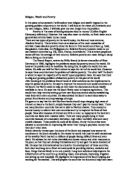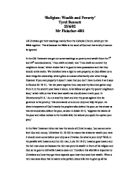We are able to see a stark contrast to how modern Christians have acknowledged these warnings in comparison to their predecessors. Today, as the world seems to become more secular, many people feel that being prosperous is their aspiration in life. The financial success of charities does not even compare to the superb success of the National Lottery and other means of gambling, showing how much a Christian craves for wealth. If we look at how western leaders such as Bush and Blair have ‘helped their neighbours’, we find that they are hardly doing much. In recent events, they are spending money on producing weapons to tackle terrorism and have completely shut out the issue of world poverty. So, in the question of has Jesus been successful in his message regarding wealth and poverty, we find the answer is negative for most. However, the second Vatican council of the Roman Catholic Church stated that there was no separation between the religious and the secular world; it’s all God’s. Therefore faith and justice are linked together. The catechism of the Catholic clearly states that “The happiness is not found in riches or well being, in human fame or power, or in human achievement ….God blesses those who come to the aid of poor and rebukes those who turn away” So although it may seem Jesus’ message regarding wealth and poverty has been abandoned, there are still trying to revive it.
Islam, Another world religion, also emphasises the need to help the poor and it says in the Qur’an: “The true believers are those who believe in God and his messenger (Muhammad) and afterward doubt not, but strive with their wealth and lives for the cause of God such are sincere” This clearly shows that a true Muslim believer is the one who gives, works and does his best to help those in need. The Qur’an also tells Muslims the great immense amount of reward and deeds charity can bring: “And those who spend their wealth in by night and day in secret and in the open, their reward is from their lord, and no fear shall be upon them nor shall they grieve” Other than the Qur’an, the Muslims second source The Prophet Muhammad (pbuh) states in an authentic hadith recorded by Imam Bukhari that: “Every Muslim has to give charity” The people asked, “O Allah’s Prophet! If he has nothing to do what will he do?” “He should work with his hands and benefit himself and also give in charity (from what he earns). Then the people further asked, “If he cannot find even that?” He replied, “He should help the needy who appeal for help”. Then the people asked, “If he cannot do that?” He replied “then he should perform good deeds and keep away from evil deeds and this will be regarded as charitable deeds” This emphasises the need to give charity and has been made an obligation for every Muslim and even if they are unable to give direct money they should still give their health and work towards charity. In Islam, giving charity giving charity is not seen as losing anything as The Prophet (pbuh) says in an authentic hadith: “The reward in giving charity to relatives is doubled by Allah as a reward for being given to relatives” If we were to look at the current state of the Muslim Ummah, (body) we can see that they have totally neglected this ideology and are in risk of becoming in a state of Kufr (non-Muslim) according to the authentic hadith by Bukhari where it says: “If you don’t love for your brother what you love for yourself you don’t have faith. He who goes to sleep while his neighbour starve, he is not a Muslim” If we look at current Muslim Countries such as Saudi Arabia and how they are helping their brothers and neighbours we can see that they are less than their potential. However due to the fact that Zakat (charity has been made one of The Five Pillars of Islam, mosques are doing their best to try and raise as much money as possible by setting up pillar boxes and working alongside charities like Islamic Relief. The obligatory amount of money waged upon Muslims by the Islamic State is 2.5 percent of their wealth.
Both religions teach to help the poor and needy but have abandoned charity donations. Jesus and Prophet Muhammad (pbuh) seem to have failed to teach people about the wisdom behind giving charity. However, holy places like Mosques and Churches still thrive towards charity. Although our world leaders Bush, Blair and king Fahad seem to have neglected charity there are still a few people doing what is right and helping the poor.
Such are people who have formed organisations and groups and strive to end poverty under the banner of their religion. Groups such as Muslim Aid who works towards ending world poverty. Although their title may seem prejudice towards other religions but in actual fact they are universal and care not about the country or the people’s religion. “Whoever saved a life, it would be as if he saved the life of all humanity” Since its inception in 1985, this verse has lain at the heart of Muslim Aid’s philosophy. Through generous donations and legacy contributions, Muslim Aid has helped save and improve the lives of millions of people in 44 poorest countries of the world. Through long-term development programmes, Muslim Aid responds quickly to emergencies by sending relief supplies such as food, medicine and clothes to the victims of natural disasters, wars and famines. However like most overseas charities, its most important work is to tackle the roots of poverty by funding long-term development projects. The programmes include the provision of clean water, healthcare, skills training, education and welfare for the most vulnerable sections of the society such as orphans and widows. The aim of development work is so that people are able help themselves.
During August and September 1998, terrible floods devastated the lives of 30 million people in Bangladesh thus destroying their homes, crops and sources of safe, clean water. With the flood victims having to use contaminated water, diseases such as malaria, typhoid, dysentery and diarrhoea spread causing even more suffering. Muslim Aid launched an appeal reaching thousands of donors and masses through media and direct mail. It allocated more than £350,000 to help rebuild houses and install thousands of hand pumps for safe, clean water. It supplied them with aid packages containing food, medicine and clothing. Boats were used to reach the most needy and isolated communities, benefiting one third of a million people.
There are more charities like Muslim Aid all over the globe working towards world development, but their work alone is insufficient. Average people need to awaken and rise from their sleep and begin to help those who need them most.
Other charities like Christian Aid and CAFOD all raise money under different religious banners. So, although it t see much harm in may seem that religion is not helping end world poverty and Jesus and Prophet Muhammad (pbuh) have been a total failure regarding this issue, organisations like the ones stated utterly refute this view.
I disagree with the view that “there should be no rich as long as there is world poverty as firstly, I cannot see much harm in having a bit of wealth as long as this money is used properly and given to the poor. Also, if everyone were poor, who would help the poor? The statement should not be “there should be no rich” but should be “money should not be spent extensively as long as there is world poverty.” God does not say anywhere in the Qur’an or Bible that wealth is forbidden but in actual fact God says in the Bible: “Selling their possessions and goods, they gave to anyone in need” If there should be no rich how would have these people gained these possessions the bible mentions hence, the statement “there should be no rich as long as there is world poverty” can be seen as totally irrational, as no ordinary person would be willing to give up all his wealth and start begging on the streets moreover, what is more logical is for a man to attain wealth but to use a substantial amount for himself and give a generous, sensible amount to charity. However, wealth and being rich can be dangerous and I am able to see why people, especially those onlookers of third world countries, will agree with this statement. If we look at current events we can see a man has paid fourteen million pounds for a holiday break on the moon and people such as Richard Branson (Virgin) are spending vast amounts of money on hot air balloons. The payments that went towards such events could have helped charities a great deal but instead it went towards luxury expeditions. Also northern countries only withhold twenty-five percent of the world’s population yet receive seventy –five percent of the world’s income. This shows money has not been used/divided properly. Even with these factors, having great wealth is not the real threat to poverty but participating in luxurious activities and exploiting money is the unseen cause. There is nothing wrong with a man working hard for his money as long as he understands that he must use this money properly. So, I end by saying money is no the real issue that causes poverty, it is the people that are the real problem. Religions do not curse the money, they curse the people who have money but do not use it appropriately.
Sahih Al Bukhari Hadith number 491
Sahih Al Bukhari Hadith Number 500
Sahih Al Hadith number 27







